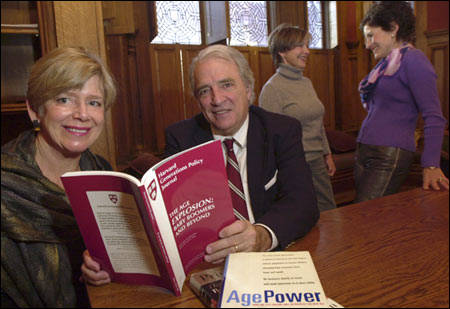New journal examines ‘Age Explosion’
Generations project, retirement institute, launch annual publication

The Harvard Institute for Learning in Retirement and the social advocacy nonprofit Generations Policy Initiative have launched a new journal that aims to highlight problems related to the aging of America’s baby boom population.
“Nationally and internationally, we haven’t paid serious attention to the aging of the baby boom. We’ve been giving it lip service, but we haven’t started to plan for it and work with realistic numbers,” said Paul Hodge, the journal’s founding editor and director of the Generations Policy Project at the John F. Kennedy School of Government and a research fellow at the Kennedy School’s Hauser Center.
Hodge and the journal’s other editor, Leonie Gordon, director of the Harvard Institute for Learning in Retirement, said the problems the journal is intended to highlight stem from the baby boom’s huge numbers.
Baby boomers are those born between 1946 and 1964, and number an estimated 75 million. They’re rapidly approaching retirement, with the first hitting 65 in 2011. Their numbers, coupled with life-extending advances in science and health care, will create a spike in the 65-plus population for decades after that.
Between 2010 and 2030, the 65-plus population will grow by 75 percent, to 69 million. Not only will more people be elderly, but more elderly will be older, with a rapid rise in the age 85 and older population. The end result will be a situation where more people rely on the retirement system while fewer people of working age support that system.
The effects of the retiring baby boomers will be felt in all reaches of society, from Social Security and Medicaid to shortages in the labor pool to questions of social justice such as those around age discrimination.
“The subject is incredibly timely,” Gordon said. “The world is aging visibly and radically around us. … I don’t think it’s being ignored, but it’s relegated to the back burner because there are so many other pressing issues.”
Called The Generations Policy Journal, the publication aims to shine a bright light on these issues. It will be published once a year and circulated to top policy-makers, including national leaders and interested citizens.
The initial response has been quite favorable, Hodge said, and led to an invitation to participate in the World Economic Forum later this month in Davos, Switzerland.
The inaugural issue, titled “The Age Explosion: Baby Boomers and Beyond,” presents a good overview of the subjects to be described in future editions, Gordon said. It contains nine articles, as well as a preface by former Harvard President Derek Bok. Subjects tackled in its pages include aging issues related to public policy, elder care, financial hurdles of aging women, higher education, the Internet, older consumers and the environment, and how aging worldwide will affect global politics.
Authors include Hodge; Gordon, who co-authored a piece with Dean of Continuing Education Michael Shinagel; Deputy Commissioner for Policy at the Social Security Administration Paul Hewitt; Estelle James, a visiting fellow at the Urban Institute and consultant to the World Bank; Associate Professor of Public Policy at the John F. Kennedy School of Government David Lazer; and Kevin Kinsella, a special assistant in the U.S. Census Bureau’s International Programs Center. Other authors include Kennedy School Associate Professor of Public Policy Viktor Mayer-Schoenberger, AARP Executive Director William Novelli, Boston College Sociology Professor Juliet Schor, and Newsweek Contributing Editor and Chief Economic Correspondent Richard Thomas.
One of the primary misconceptions about the aging baby boomers, Hodge said, is that there’s time to deal with the problem. With the first boomers starting to turn 60 and the long lead time financial investments need to bear fruit, he said, time – at least that needed to deal with financial security of the coming retirement boom – is running out.
With no action, Hodge said, many older Americans, disproportionately women and minority, will fall into poverty.
In addition, Hodge said, much of the information policy-makers rely on to make decisions is outdated or inaccurate. He cited statistics on longevity used to project future costs of retirement systems as an example. Hodge believes that people are going to live longer than expected, creating an unanticipated drain on financial resources needed to support them.
When asked if a crisis is coming, Hodge replied, “It’s not only coming, it’s here.”
In his article in the journal, Hodge makes specific recommendations for policy-makers. He recommends reassessing estimates of longevity regularly, making the financial security of baby boomers a top priority, and creating a “generations impact statement” for legislation that details how proposed laws would affect different age segments of society.
In conjunction with the journal’s publication, Gordon said she’d like to foster discussion with Harvard students and make them aware that their parents’ retirement needs their attention.
Hodge stated that the Generations Policy Project is planning an undergraduate symposium in March or April titled, “Can You Afford Your Parent?”




